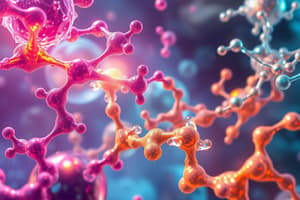Podcast
Questions and Answers
What do water's hydrogen bonds allow?
What do water's hydrogen bonds allow?
Allows water to have special properties such as cohesion, adhesion, and surface tension.
How do monomers form polymers?
How do monomers form polymers?
Dehydration synthesis.
What happens in hydrolysis?
What happens in hydrolysis?
Polymers are broken down into monomers.
Nucleic acids make up ___
Nucleic acids make up ___
What are nucleic acids made up of?
What are nucleic acids made up of?
What do amino acids make up?
What do amino acids make up?
What determines a protein's structure and function?
What determines a protein's structure and function?
How are carbohydrates formed?
How are carbohydrates formed?
What are lipids?
What are lipids?
Flashcards are hidden until you start studying
Study Notes
Water and Its Properties
- Hydrogen bonds in water create unique properties: cohesion, adhesion, and surface tension.
- Cohesion causes water molecules to stick together, facilitating processes like water transport in plants.
- Adhesion allows water to stick to other surfaces, contributing to phenomena such as capillary action.
Formation of Polymers
- Monomers link to form polymers through a process known as dehydration synthesis.
- Dehydration synthesis involves the removal of water to form covalent bonds between monomers.
Hydrolysis Process
- Hydrolysis is the process where polymers are cleaved back into monomers.
- It involves the addition of water, breaking the covalent bonds.
Nucleic Acids
- Nucleic acids include DNA and RNA, essential for storing and transmitting genetic information.
- They are critical for the inheritance of traits and protein synthesis.
Composition of Nucleic Acids
- Nucleic acids are made from nucleotides.
- Each nucleotide consists of a sugar (deoxy/ribose), a phosphate group, and a nitrogenous base.
Amino Acids and Proteins
- Amino acids are the building blocks of proteins.
- The specific sequence of amino acids in a polypeptide chain determines the protein's final structure and function.
Carbohydrate Formation
- Carbohydrates are formed when sugar monomers bond together via dehydration synthesis.
- This process results in the formation of polysaccharides such as starch and glycogen.
Understanding Lipids
- Lipids are nonpolar molecules that include fats, oils, and phospholipids.
- Saturation levels in lipids influence their physical properties and biological functions.
- Commonly, lipids are integral components of cell membranes, contributing to their structure and fluidity.
Studying That Suits You
Use AI to generate personalized quizzes and flashcards to suit your learning preferences.




